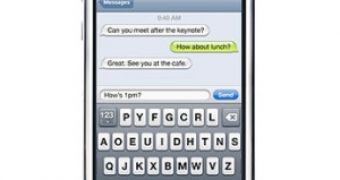The iPhone has undergone a large number of tests since its release. Most of them have been conducted in order to crack it or at least test its weaknesses and demount its mythical status. User Centric's research, although not looking to do this intentionally, also casts a bad light on Apple's handset.
User Centric started their study with the purpose of seeing if texting is a potential problem for new iPhone customers. The handset brings major changes when it comes to functionality and some of them might be more difficult to adapt to than others. The virtual QWERTY keypad is one of them and also the subject of this company's study.
Results have shown the fact that the iPhone is two times more difficult to handle when introducing long texts. Still, the study has also seen that the subjects' performances considerably evolved as their experience in handling the iPhone increased.
The study surely had some flaws. First of all, it has been conducted only on 20 participants, a number that any respectable research team would not even consider to take as being representative. Moreover, none of those taking part had previous experience in handling the iPhone. Half of them owned a phone with a QWERTY keypad, while the others owned one with a numeric keypad.
Despite the keyboard similarities, QWERTY phone users managed to enter text in their iPhones in nearly twice the time that they needed for entering it in their own handsets. On the other hand, multitappers seemed to lack any problems in typing messages on the iPhone. For this reason, the device turns out to be just as easy to handle as regular QWERTY smartphones are.
The study's conclusion has been that both QWERTY and multi-tap users will eventually adapt to the iPhone's features, being able to reach a high efficiency in entering text in their handsets. Still, the multi-tappers will see a great positive difference right from the start, while QWERTY phone users will find the transition highly frustrating at first.

 14 DAY TRIAL //
14 DAY TRIAL //